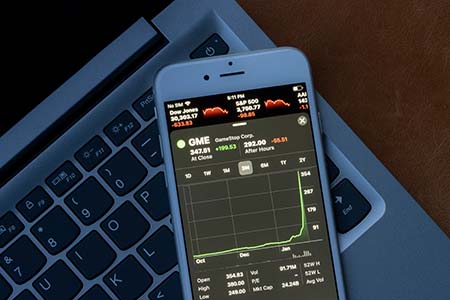Last month, all eyes were on the stock market, as household names like GameStop and AMC Entertainment were suddenly thrust into the national spotlight by a retail investor frenzy. Stock prices ebbed perilously higher when an organized army of Reddit users battled against Wall Street hedge funds who had shorted the stocks. But as quickly as it started, the market feeding frenzy soon came crashing down.
 Many of the individual investors – oftentimes, average Americans that had taken out loans and risked their savings – that had invested in these stocks too late were left holding the bag at the end of the rally.
Many of the individual investors – oftentimes, average Americans that had taken out loans and risked their savings – that had invested in these stocks too late were left holding the bag at the end of the rally.
Although market mania early in this calendar year surprised many, it was just the latest and most profound example of the exuberance we’ve witnessed in the stock market.
Throughout 2020, we saw stock valuations hit historical heights – the kind of peak ranges that were witnessed in 1929, prior to the stock market crash and similarly, in 1999, just before the dot com boom. At the end of the day, stocks are meant to reflect the economic reality of a company. But that’s not what’s been happening recently. Large amounts of froth and exuberance from individual investors is leading to the formation of speculative bubbles, which is a dangerous sign for the market.
Widespread speculation and a rise in betting with borrowed money along with a boom in day traders using Reddit and other forms of social media to boost meme stocks have contributed to a massive spike in the volume of bullish call options being traded.
The rise of the individual investor has clearly been one of the major narratives of 2021 so far, and it appears likely that retail traders will continue to be a force in the market. They’ve helped send trading volumes for stocks and options to record highs, pushing electronic brokerages like Charles Schwab and Robinhood to new heights, along with exchanges like ICE and Nasdaq. Institutional money flowed in to take advantage of the retail investor-initiated frenzy, pushing volumes and headlines.
But is this breakneck pace sustainable? As market engagement continues to skyrocket, analysts, institutional investors, and even lawmakers fear that the market fundamentals have become irrelevant.
While the recent GameStop frenzy has heightened fears about the stock market’s current viability, concerns about another sector of the market – bonds – have been growing for years. Ever since the global financial crisis of 2008, economists have been sounding the alarm on the trillions of dollars in new debt that the U.S. government keeps issuing. And it might be time for investors to take their concerns seriously.
The deficit, debt and demographic concerns hanging over the markets for the last decade have only been compounded by the COVID-19 health crisis. With another stimulus package in the works – which will mean more debt heaped onto the pile – and looming inflation, bondholders are stuck between a rock and a hard place.
If yields stay low, the income from bonds won’t even cover the impact of inflation. Conversely, if yields continue their recent upward surge, the value of bonds will start to fall. It’s a no-win situation.
Marc Odo, CFA, FRM, CAIA®, CIPM®, CFP®, Client Portfolio Manager, is responsible for helping clients and prospects gain a detailed understanding of Swan’s Defined Risk Strategy, including how it fits into an overall investment strategy. Formerly, Marc was the Director of Research for 11 years at Zephyr Associates.
Swan Global Investments, LLC is a SEC registered Investment Advisor that specializes in managing money using the proprietary Defined Risk Strategy (“DRS”). SEC registration does not denote any special training or qualification conferred by the SEC. Swan offers and manages the DRS for investors including individuals, institutions and other investment advisor firms. A
All Swan products utilize the Defined Risk Strategy (“DRS”), but may vary by asset class, regulatory offering type, etc. Accordingly, all Swan DRS product offerings will have different performance results due to offering differences and comparing results among the Swan products and composites may be of limited use. All data used herein; including the statistical information, verification and performance reports are available upon request. The S&P 500 Index is a market cap-weighted index of 500 widely held stocks often used as a proxy for the overall U.S. equity market. Indexes are unmanaged and have no fees or expenses. An investment cannot be made directly in an index. Swan’s investments may consist of securities that vary significantly from those in the benchmark indexes listed above and performance calculation methods may not be entirely comparable. Accordingly, comparing results shown to those of such indexes may be of limited use. The adviser’s dependence on its DRS process and judgments about the attractiveness, value and potential appreciation of particular ETFs and options in which the adviser invests or writes may prove to be incorrect and may not produce the desired results. There is no guarantee any investment or the DRS will meet its objectives.
All investments involve the risk of potential investment losses as well as the potential for investment gains. Prior performance is not a guarantee of future results and there can be no assurance, and investors should not assume, that future performance will be comparable to past performance. All investment strategies have the potential for profit or loss. Further information is available upon request by contacting the company directly at 970-382-8901 or swanglobalinvestments.com.com. 061-SGI-030821